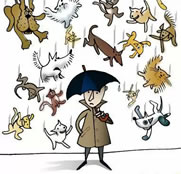This is a series of posts in which I (Bear) poke fun at common phrases and expressions from an “autistic” point of view. What do I mean by that? Well, autistics have a tendency to take things very literally, and a lot of these phrases don’t make any sense at all when you do that.
“They get along like a house on fire”. Come on, really? Are you listening to yourself? Fire is a destructive force. If you were on fire, you wouldn’t say that you and the fire “get along”. You would be doing whatever you could to put yourself out. And if houses could experience emotions, no doubt they would similarly express a desire not to be engulfed in flames. Not wanting to be on fire is one of few things that is truly universal.
To say that two people “get along like a house on fire” would better describe a relationship that’s extremely one-sided or abusive. The person who’s the “fire” in this metaphor is obsessed with the “house”, but the “house” doesn’t want to have anything to do with them.
When a fire is left unattended, it spreads and destroys a house from the inside out. Is this how you perceive the positive relationships in your life? If you do, quickly find some new people to spend your time with. If not, don’t use this expression.
